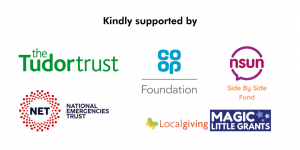Rhian Harris is one of our meet up Hosts in Norwich. She’s written this amazing blog about her experience of grieving, for National Grief Awareness Week 2020. If you’d like to share your story, do get involved using the hashtags #NGAW20 and #ShareYourStory.
There are as many ways to grieve as there are people, and there’s no ‘right’ way to grieve. This is my own experience of grieving after losing my brother in April 2019, which I want to share as part of National Grief Awareness Week 2020’s ‘Share Your Story’ campaign.
Here are ten things I’d like to share about my own experience of grieving:
1. Grief doesn’t end. It can change over time, but grief is love and just as I’ll never stop loving my brother, I’ll never stop grieving him.
2. Just because someone is smiling doesn’t mean they’re not grieving. It’s possible to feel contrasting emotions at the same time, and beginning to understand this has been liberating for me in beginning to understanding how I can experience happiness again after losing my brother. Many grieving people also put on a ‘mask’ around other people, which can be mistaken for them having ‘moved on’.
3. Grief can come in waves. The way in which I experience grief is that, out of nowhere, I can hit by a wave. It could be hearing a song we played at my brother’s funeral, playing out over the loudspeaker in Tesco when I’m in the frozen pizza aisle, stopping me in my tracks. Or it could be just being alone, with nothing to distract me from my thoughts. Out of nowhere, the wave hits. It rises up suddenly and crashes down onto me, tossing me around. In the moment it’s as painful as ever, but I now know that eventually, the storm will quieten and subside.
4. It’s not wrong to want to do normal things. I used to feel guilt about wanting to do ‘normal’ things from before my brother died, like going out to a pub quiz. Then I heard about the Dual Process Model of Grief, which explained the role of both ‘loss- oriented’ and ‘restoration- oriented activities’ in processing of grief. Restoration oriented activities- like doing the pub quiz- provide me with a vital break from my grief, and oscillation between the two modes is normal.
5. Analogies can help articulate grief. My counsellor gave me some useful analogies which helped me to articulate my grief. One analogy helped me to understand that while the size of the hole losing my brother left will never become smaller, it is possible for life to ‘grow around the grief’. This gave me hope. There’s a useful video explaining this analogy here.
6. Grief can feel like a physical weight. Sometimes it feels like I have weights tied to my ankles, slowing me down.
7. You end up reassuring other people. Small talk, like a hairdresser asking whether you have any brothers or sisters, or what you’re doing for Christmas, can become tricky to navigate. It can involve weighing up in a split second how well you know the person, what and how much to share- and what the alternatives are. If I decide to share, it often ends up with me reassuring the person I’ve told: ‘It’s fine, honestly’, when it’s clearly not fine. It’s hard to feel the other person’s discomfort without rushing in to make them feel better.
8. You don’t just grieve the person you’ve lost. A multitude of griefs can follow a bereavement. I grieve the person I was before I lost my brother; the person my brother would have become; my mum as she was before she lost her son; my identity as a big sister; I even grieve the experience of cracking in- jokes with my brother that no one will ever now ‘get’.
9. Grief doesn’t have to be ‘developmental’. I’m not sure where it comes from, but there can be a pressure for bereavement or other traumatic events to be developmental or lead to some kind self- improvement. Perhaps it’s a way of trying to make some sense of senseless events, but I don’t believe loss has to be developmental, it can just be awful.
10. Reach out. If you know someone who’s grieving, send them a message. You don’t need to have any answers, or be able to take the pain away. They might not feel able or know how to respond, especially in the beginning. But just knowing someone is there for you can make a huge difference. Similarly, if you’re the person grieving, reach out for support. Julia Samuel has spoken about the importance of support after bereavement:
“It isn’t the circumstances of the death that will predict a positive or negative outcome. It is the support they get at the time and after the death. This is the key component to anybody finding a way to rebuild their life.”
Rhian Harris
If you’d like to share a story like Rhian has, please get in touch. Just email blog@letstalkaboutloss.org to submit your story.


